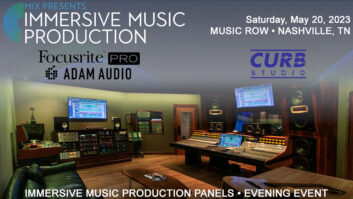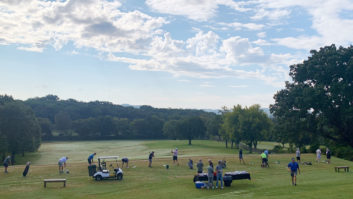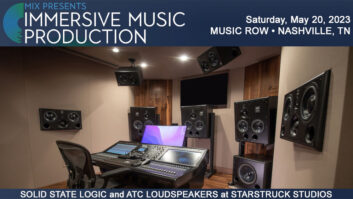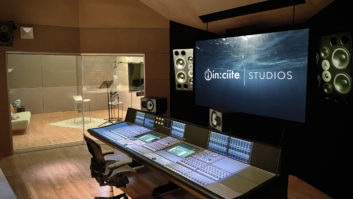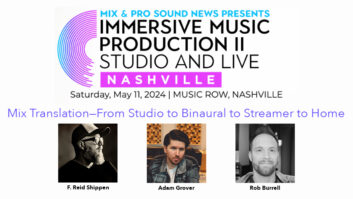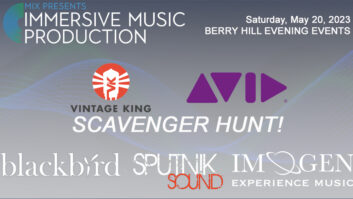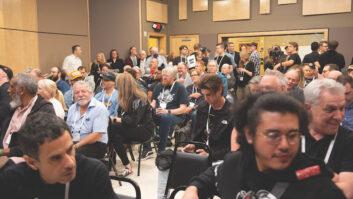
Nashville, TN (July 14, 2020)—The long fight to reverse Nashville Metro Council’s 1998 residential zoning ordinance that made it illegal for residence-based recording studios and other businesses to serve clients on the property has ended. On July 7, Nashville Metro Council members voted 25-14 in favor of a bill that creates a new annual permit allowing home businesses—including recording studios—to welcome clients into the owner’s home or an accessory building.
The tussle started in 2015, when Elijah “Lij” Shaw, owner and operator of The Toy Box Studio in East Nashville and the man behind Bonnaroo’s Hay Bale Studio, was served with a cease and desist letter by the city preventing him from continuing to work out of his converted garage studio. By that time, Shaw had been working for about a decade out of his home, where he has recorded and produced artists including the Zac Brown Band, Mumford & Sons, John Oates, Tori Amos and Wilco (the band’s Pat Sansone gave the studio its name).
Shaw decided to fight back and joined forces in that endeavor with Nashville hair stylist Pat Raynor. A semi-retired widow, Raynor had previously undertaken an expensive renovation to her garage to establish a one-chair hair salon with a valid Tennessee cosmetology license. Together, with the support of the Institute for Justice (IJ) and the Beacon Center of Tennessee, the pair appealed to Nashville Metro for relief.
Shaw also garnered about 165,000 signatures through a Change.org campaign and, more critically, eventually won the support of Dave Rosenberg, a Nashville City councilman. Rosenburg introduced a new bill in 2019, supported by three fellow council members, that would amend the law to allow clients to visit residential businesses in the city of Nashville and Davidson County, the area affected by the original ordinance.
Belmont Church Dials Up dBs with d&b As
But after several years of legal battles and petitioning, it seems that the current coronavirus pandemic was what finally lit a fire under Nashville Metro Council to pass a bill and force Nashville to live up to its Music City moniker. As council member Jeff Syracuse told the Tennessean publication days ahead of the vote, “I’m very concerned, especially with coronavirus and what it’s doing to our musicians, producers and engineers—they’re going to be among the final aspect of our business community to get fully back to business. We really need to do this now to support them. Keep the music being created in Music City.”
When Shaw filed his suit against the 1998 ordinance, which imposed steep fines and potential imprisonment, the IJ analyzed Nashville’s business records and discovered at least 1,600 home-based businesses operating within the limits of Nashville’s consolidated city-county jurisdiction, many of them illegally. More than 14,000 home businesses are reported to have state permits in Davidson County currently. Nashville has a long history of residential recording studios—some have appeared in the pages of PSN over the years—so it’s possible that hundreds of engineers, producers and artists could now emerge from the shadows and apply for the annual permit for their home facilities.
Not surprisingly, home studios and a list of businesses that includes tutors, personal care services, artisanal or small manufacturers and fitness, arts and crafts classes must follow certain rules stipulated in the new bill. Fundamentally, the bill specifies that video and audio production staging and recording is allowed provided it takes place inside and does not generate noise outside. A business can occupy no more than 20% of the principal home structure, and up to a maximum of 1,000 square feet of the total floor area in that structure and any legally permitted accessory buildings.
Beginning in 1989, the city of Los Angeles also went through legal wrangles as commercial recording studios sought to shut down home-based facilities set up without the proper zoning. That fight was an ill-fated attempt to hold back the inevitable wave of home recording, but it was also triggered by neighbors complaining about the noise and traffic associated with people and equipment coming and going at all hours in quiet residential streets.
Opponents of the permitting change in Nashville voiced similar concerns about managing traffic and having strangers in their neighborhoods. When Shaw filed his suit back in 2017, he told Nashville’s NewsChannel 5 that none of his neighbors had ever complained about his operation. Indeed, 50 of his neighbors banded together in his support and signed a petition during his failed appeal against Metro’s shut down of The Toy Box.
To assuage neighborhood concerns, the new bill therefore restricts a home business to no more than three customers per hour. A maximum of six customers are permitted between the hours of 8 a.m. and 7 p.m., Monday through Saturday.
In addition to the homeowner, one non-resident employee, part-time or full-time, is allowed to work at the business. No more than five employees may reside within the dwelling at a home occupation location.
To further preserve the residential character of the neighborhood, no business signs or other indications of commercial activity are allowed outside the building. Only one passenger vehicle associated with the business is allowed on the premises, according to the new rules, and no commercial vehicles may be parked outside the residence.
Residential businesses have continued to flourish over the years in the jurisdiction in no small part because illegal ventures get shut down only in response to complaints. Going forward, it remains to be seen how many non-permitted businesses wishing to buck the new regulations continue to fly under the radar, since Metro Codes enforcement officials lack the authority to enter a residence without the permission of the owner unless they are investigating a complaint.
